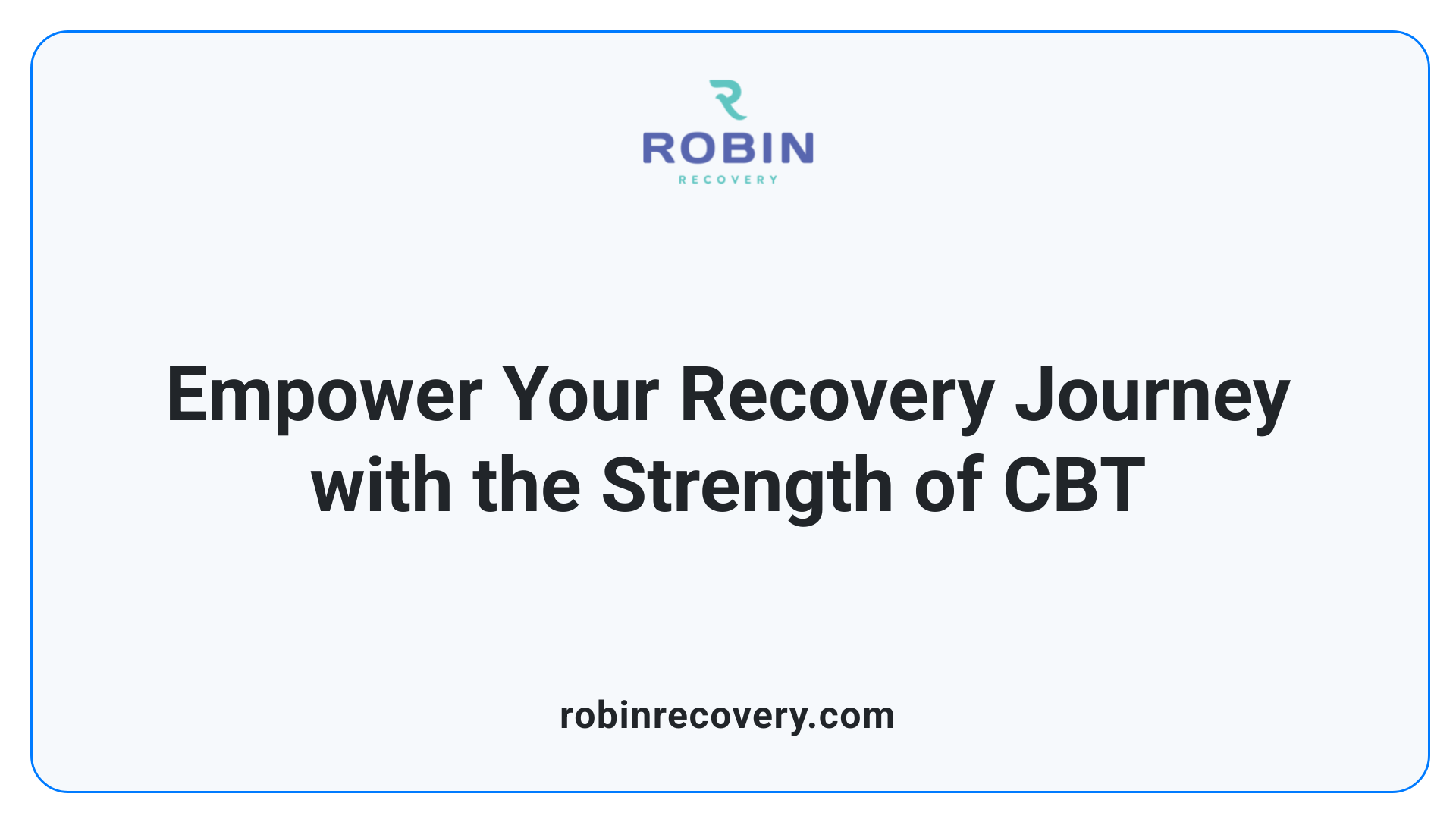How Cognitive-Behavioral Therapy Supports Long-Term Recovery Success

Understanding the Long-Term Impact of CBT on Addiction Recovery
Cognitive-behavioral therapy (CBT) has established itself as a cornerstone in treating substance use disorders (SUDs). Its focus on modifying dysfunctional thoughts and behaviors makes it especially effective for achieving sustained recovery. This article explores how CBT supports long-term success, the mechanisms, techniques, and scientific evidence behind its efficacy, and its vital role in relapse prevention.
Core Principles and Goals of CBT in Long-Term Recovery
What is the long-term goal of CBT?
The aim of cognitive-behavioral therapy (CBT) over the long term is to help individuals replace dysfunctional and unhelpful thought patterns with more flexible, adaptive, and realistic ones. This transformation supports improved emotional regulation, reduces harmful behaviors, and fosters better mental health overall.
CBT puts a strong focus on developing new coping mechanisms and problem-solving skills. These abilities enable individuals to handle stressors, triggers, and life challenges more effectively without resorting to substances or maladaptive responses.
Techniques like cognitive restructuring, affect regulation, and re-attribution are used within CBT to create lasting changes. Through these methods, individuals learn to interpret their experiences differently, which in turn reinforces healthier behavioral choices.
Ultimately, the overarching goal of CBT is to empower individuals to manage their thoughts and behaviors independently. This independence enhances their capacity for resilience, supports healthier habits, and helps maintain sobriety over time. As a result, those in recovery are more equipped to sustain their progress and improve their quality of life in the long run.
Techniques and Strategies Used in CBT for Sustained Recovery
What techniques are used in CBT that promote lasting recovery?
Cognitive Behavioral Therapy (CBT) employs a variety of proven techniques to support individuals in maintaining sobriety over the long term. Central to these methods is cognitive restructuring, which helps clients identify and challenge distorted or negative thoughts that may trigger substance use. By replacing these with more realistic and positive beliefs, individuals develop a healthier mindset.
Another core technique is behavioral activation, encouraging clients to increase participation in rewarding and healthy activities. This alleviates feelings of boredom, reduces stress, and decreases the likelihood of relapse.
Skills training forms a fundamental part of CBT, including teaching coping strategies, problem-solving, communication skills, and emotional regulation techniques. These help clients handle stressors and high-risk situations more effectively.
To further support recovery, CBT integrates mindfulness practices and relaxation exercises. These techniques help individuals stay present, manage cravings, and regulate emotions during stressful moments.
Exposure exercises are used to gradually confront and desensitize individuals to triggers, thereby reducing avoidance behaviors related to substance cues.
Relapse prevention strategies are critical, guiding clients to recognize early warning signs of relapse and develop personalized coping plans. This includes understanding emotional, mental, and physical relapse stages, and employing strategies to counteract them.
Collectively, these techniques foster increased self-awareness and resilience. They enable individuals to develop healthier habits, manage distress, and maintain long-term sobriety, promoting overall mental well-being and stability.
The Role of Triggers and Cognitive Restructuring in Avoiding Relapse

How does CBT contribute to relapse prevention and maintaining recovery over time?
Cognitive-Behavioral Therapy (CBT) plays a significant role in preventing relapse by teaching individuals to identify and manage the cues and thoughts that can trigger substance use. A core component of CBT involves recognizing high-risk situations, such as certain environments, emotional states, or social settings that may prompt craving or use.
A key technique used in CBT is cognitive restructuring, which helps individuals challenge and reframe negative or distorted beliefs about their ability to stay sober. For example, replacing thoughts like "I'll never be able to resist the urge" with "I have the skills to handle cravings and stay on track" boosts confidence and self-efficacy. This sense of belief in one's capabilities is crucial for perseverance during difficult moments.
Careful analysis of automatic thoughts—quick, involuntary thoughts that arise in response to triggers—as well as external cues such as peer pressure or stressful events, enables individuals to develop healthier responses. Strategies like mindfulness, stress management, and problem-solving further bolster emotional regulation, reducing the likelihood of impulsive substance use.
Research shows that these techniques can decrease relapse rates substantially, with some studies indicating up to a 60% reduction in repeated substance use episodes among those trained in CBT methods. Integrating relapse prevention components into treatment builds resilience and supports long-term recovery, making CBT an essential part of ongoing addiction care.
Scientific Evidence Supporting CBT’s Long-Term Efficacy

Numerous meta-analyses and randomized controlled trials have firmly established the effectiveness of Cognitive Behavioral Therapy (CBT) in supporting long-term recovery from substance use disorders. These studies often report moderate effect sizes, approximately d=0.45, indicating significant clinical improvements in reducing substance use and preventing relapse.
A key finding from meta-analytical research is the durability of CBT’s benefits. For example, about 60% of patients undergoing CBT for cocaine dependence remained abstinent, as evidenced by clean toxicology screens, at 52 weeks post-treatment. This demonstrates that the behavioral and cognitive changes fostered through CBT are sustained well beyond the immediate treatment period.
CBT’s success is further enhanced when combined with other interventions such as contingency management (CM) and family-based therapies. Such combination strategies have shown to produce more robust and enduring outcomes, addressing both behavioral patterns and social influences on addiction.
Research into related mental health conditions, like depression, also supports the longevity of CBT’s effects, with improvements persisting for years after therapy completion. This long-term benefit is rooted in CBT’s focus on developing coping skills, restructuring maladaptive thoughts, and building resilience, all of which contribute to stable recovery.
In conclusion, the scientific evidence underscores CBT’s role as an evidence-based approach capable of supporting sustained behavioral change, significantly reducing the risk of relapse, and enabling long-term recovery. High-quality studies continue to reinforce its position as a cornerstone of addiction treatment.
Evidence Source Findings Effect Size Duration of Impact Additional Notes Meta-analyses (Magill, 2023) Moderate reduction in substance use d=0.45 Up to 1 year Durable effects when combined with other therapies RCTs Improved abstinence rates d=0.63 52 weeks 60% abstinent in cocaine dependence Related condition studies Long-term mental health benefits Variable Several years Supports lifelong resilience
The Integration of CBT with Other Treatment Modalities

What are the benefits and limitations of combining CBT with other treatments?
Combining Cognitive Behavioral Therapy (CBT) with other treatment modalities such as pharmacotherapy, support groups, and holistic therapies is a common approach within addiction treatment.
When integrated effectively, these combinations can have enhancing effects on recovery outcomes. For instance, medication-assisted treatments can help reduce cravings and withdrawal symptoms, making it easier for individuals to participate actively in CBT sessions. Support groups provide ongoing social reinforcement and accountability, supporting the skills learned during therapy.
However, research shows mixed results regarding the superiority of combined treatments over CBT alone. Some studies indicate that adding pharmacotherapy or additional behavioral treatments can improve motivation, address co-occurring mental health issues, and facilitate a more comprehensive approach to recovery.
Despite these benefits, there are notable limitations. Variability among individuals affects how well these combined strategies work. Not everyone responds similarly; some may benefit greatly, while others see limited additional gains.
Challenges include resource constraints, misconceptions about addiction, and resistance within some treatment communities. Also, not all combinations lead to significantly better outcomes, emphasizing the importance of personalized treatment planning.
In practice, tailored approaches that consider individual needs and contexts are crucial. Ensuring proper coordination among different treatment providers and continuous evaluation of progress helps optimize the synergy between CBT and other modalities. Ongoing research into combination therapies aims to clarify which strategies best support long-term recovery.
Ultimately, the goal is to leverage the strengths of each treatment type to create a holistic, sustainable path to sobriety, acknowledging that no single approach works universally. Properly integrated, these strategies can improve engagement, address complex mental health issues, and foster lasting change.
Challenges in Disseminating CBT and Improving Accessibility
What are the main barriers to wider adoption of CBT for addiction?
Disseminating Cognitive Behavioral Therapy (CBT) for addiction faces several hurdles. One major challenge is the misconception that addiction is solely a moral failing rather than a treatable health condition. This belief can lead to resistance within treatment communities that favor abstinence-only approaches.
Resource limitations also restrict access to trained therapists and treatment facilities, especially in underserved areas. Many facilities lack staff skilled in CBT, and funding constraints can hinder implementation.
Additionally, some treatment cultures may show resistance to adopting new, evidence-based methods like CBT, preferring traditional or alternative approaches.
How are initiatives trying to improve access to CBT?
To overcome these obstacles, various initiatives are underway. The use of online platforms and digital tools makes CBT more accessible by offering remote therapy sessions and self-guided programs. These innovations extend reach to populations who cannot attend in-person care.
Moreover, personalized protocols tailored to specific populations and needs are being developed to increase engagement and effectiveness. Training programs and certification pathways for therapists are expanding, enhancing the workforce capable of delivering CBT.
Through such efforts, the goal is to make CBT a standard, accessible treatment option that can effectively address addiction across diverse settings.
Barrier Description Innovative Solutions Misconceptions Addiction viewed as moral weakness Education campaigns, public awareness Resource Limitations Lack of trained providers, funding Online therapy, digital tools, training programs Community Resistance Preference for traditional approaches Evidence dissemination, integrated care models
Expanding access to CBT continues to be a priority to maximize its benefits in addiction treatment and recovery.
Conclusion: Empowering Addiction Recovery with CBT

Cognitive Behavioral Therapy (CBT) is a proven and adaptable approach in treating substance use disorders. It helps individuals identify and challenge negative thought patterns, develop healthier coping skills, and manage triggers that could lead to relapse. Scientific reviews show CBT produces moderate effects in reducing drug use and supporting long-term recovery, with benefits lasting months or years after treatment. Techniques like cognitive restructuring, skills training, and relapse prevention are central to its success.
Personalized and comprehensive programs that blend CBT with medication, family therapy, and holistic care further enhance outcomes. Making CBT accessible through digital tools and community initiatives is vital for broadening its reach. Ongoing research continues to refine these methods, exploring innovative approaches to strengthen recovery efforts.
By fostering self-awareness, emotional regulation, and resilience, CBT empowers individuals to take control of their recovery journey, encouraging sustained sobriety and improved quality of life.
The Lasting Impact of CBT on Addiction Recovery
Cognitive-behavioral therapy stands as a scientifically validated, versatile, and effective approach in supporting individuals on their journey to long-term recovery from substance use disorders. Its focus on changing thought patterns, developing coping strategies, and preventing relapse makes it an essential component of comprehensive addiction treatment. Continued innovation, better dissemination, and personalized approaches are vital to maximize CBT’s benefits, ensuring sustained mental health and improved quality of life for those striving to overcome addiction.
References
- Cognitive-Behavioral Therapy for Substance Use Disorders
- The Long-Term Benefits of Cognitive-Behavioral Therapy ...
- Cognitive Behavioral Therapy for Substance Abuse: Steps ...
- CBT in Outpatient Recovery
- How Cognitive Behavioral Therapy Supports Addiction ...
- Cognitive Behavioral Therapy (CBT) for Addiction Recovery
- Cognitive-Behavioral Therapy (CBT) for Addiction Treatment
- Cognitive–behavioral therapy for management of mental ...
- Cognitive Behavioral Therapy for Substance Abuse
